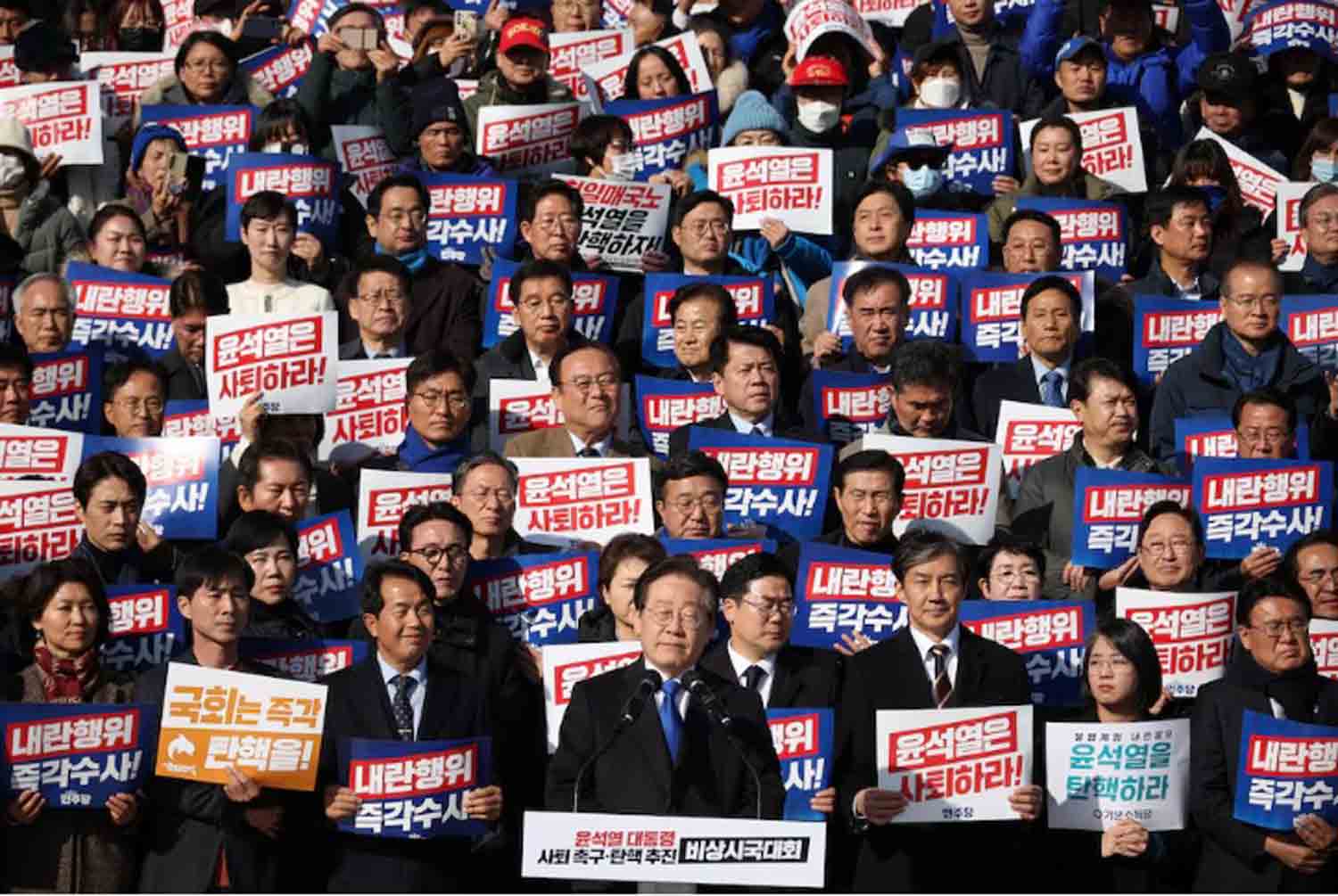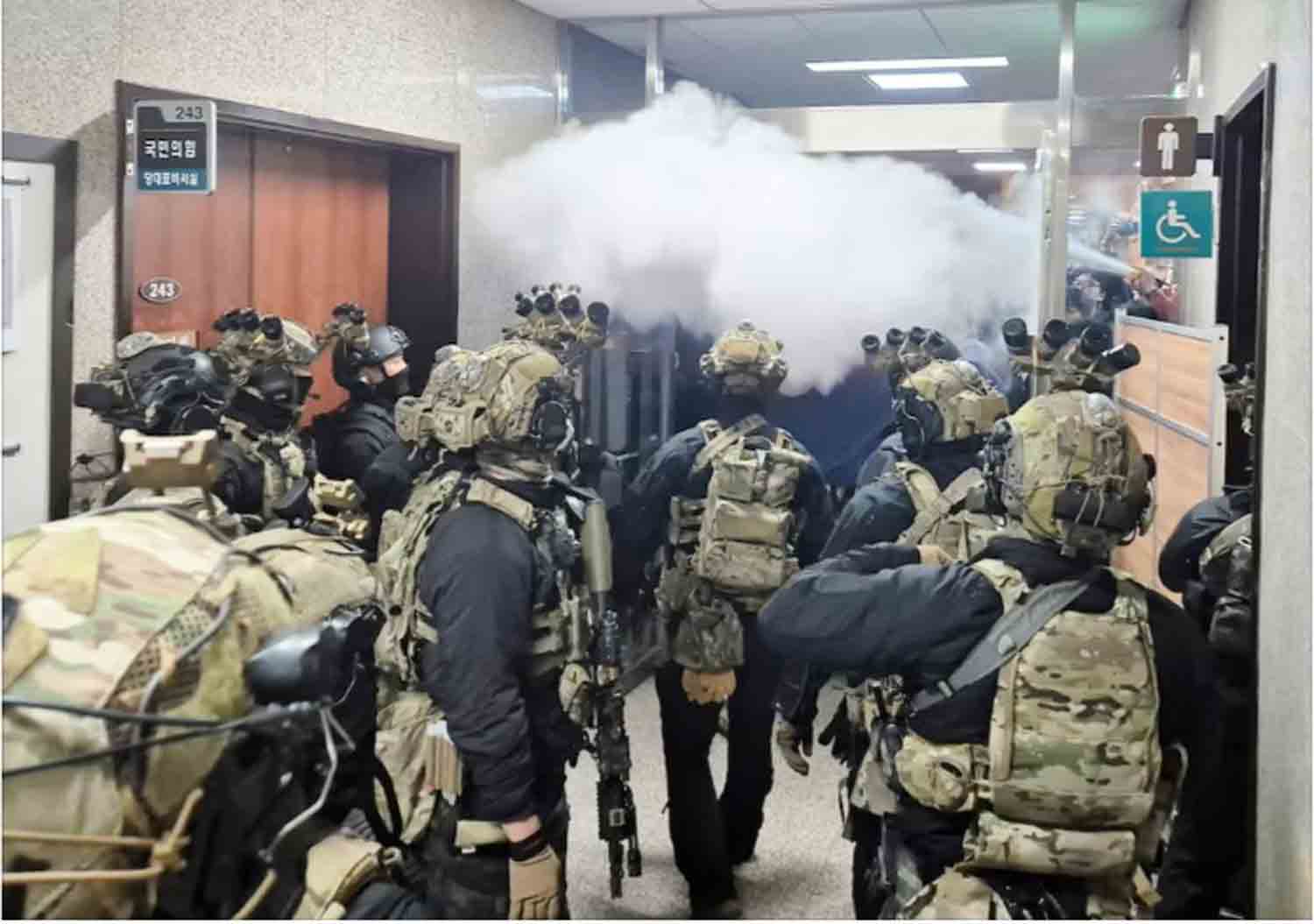South Korean legislators on Wednesday initiated calls for the impeachment of President Yoon Suk Yeol following his declaration of martial law, which he retracted just hours later, leading to a significant political crisis in Asia’s fourth-largest economy.
The unexpected announcement late Tuesday sparked a confrontation with the parliament, which opposed his efforts to prohibit political activities and impose media censorship. Armed troops forcibly entered the National Assembly in Seoul during this turmoil.
A coalition of opposition lawmakers announced their intention to introduce an impeachment bill on Wednesday, aiming for a vote within 72 hours. Hwang Un-ha, a member of the coalition, stated to the press, “The parliament must prioritize the immediate suspension of the president’s duties to expedite the impeachment process.”
The leader of Yoon’s ruling People Power Party has called for the dismissal of Defence Minister Kim Yong-hyun and the resignation of the entire cabinet.
In a televised address late Tuesday, Yoon justified the martial law by claiming it was necessary to safeguard the nation from nuclear threats posed by North Korea and anti-state elements, although he did not specify any immediate dangers. The situation escalated as helmeted soldiers entered the parliament through broken windows, while military helicopters circled above. Parliamentary aides used fire extinguishers to repel the soldiers, and clashes erupted between protesters and police outside.
The military announced a ban on activities by parliament and political parties, asserting that media and publishers would fall under the jurisdiction of the martial law command. However, just hours after this declaration, South Korea’s parliament convened with 190 of its 300 members present and unanimously passed a motion demanding the lifting of martial law, including all 18 members from President Yoon’s party. Subsequently, the president revoked the declaration.
Outside the National Assembly, protesters celebrated, chanting “We won!” while one individual played a drum. Anticipation for further protests is high, as the Korean Confederation of Trade Unions, the largest union coalition in South Korea, plans to hold a rally in Seoul and has vowed to strike until President Yoon resigns.
The U.S. embassy has advised American citizens in South Korea to steer clear of protest areas, while major companies such as Naver Corp and LG Electronics have recommended that employees work from home.
Financial markets experienced turbulence, with South Korean stocks dropping approximately 2% and the won stabilizing after hitting a two-year low. Reports indicated possible intervention by South Korean authorities to halt the currency’s decline.
In response, Finance Minister Choi Sang-mok and Bank of Korea Governor Rhee Chang-yong held emergency meetings overnight, with the finance ministry pledging to support the markets if necessary. The government stated, “We will inject unlimited liquidity into stocks, bonds, short-term money markets, and the forex market until they are fully normalized.” The Bank of Korea announced it would initiate special repo operations starting Wednesday to ensure the smooth functioning of local financial institutions.
“Yoon resign or be ousted”
Residents of Seoul monitored the situation closely through television and smartphones, engaging in discussions online, yet life continued largely as normal on Wednesday.
“I find this situation deeply troubling, and I have significant concerns about the country’s future,” stated 39-year-old resident Kim Byeong-In in an interview with Reuters. The main opposition Democratic Party has urged President Yoon, who has been in office since 2022, to either resign or face impeachment following the declaration of martial law, the first in South Korea since 1980.
“Even if martial law is revoked, he cannot escape treason charges. It has become evident to the entire nation that President Yoon is incapable of governing effectively. He should resign,” remarked Park Chan-dae, a senior member of the Democratic Party, in a statement.
The National Assembly has the authority to impeach the president if more than two-thirds of lawmakers support the motion. A trial would then be conducted by the constitutional court, which can confirm the impeachment with a vote from six of the nine justices. Yoon’s party holds 108 seats in the 300-member legislature.
Should Yoon resign or be ousted, Prime Minister Han Duck-soo would assume leadership until a new election is conducted within 60 days. “South Korea as a nation narrowly avoided a crisis, but President Yoon may have undermined his own position,” commented Danny Russel, vice president of the Asia Society Policy Institute in the United States.
The situation in a nation that has maintained a democratic system since the 1980s, and is recognized as a U.S. ally and a significant Asian economy, has raised international concerns. U.S. Secretary of State Antony Blinken expressed his approval of President Yoon’s choice to revoke the martial law declaration. “We continue to expect political disagreements to be resolved peacefully and in accordance with the rule of law,” Blinken stated in a release.
South Korea is home to approximately 28,500 American troops, a remnant of the Korean War from 1950 to 1953. According to Yonhap news agency, scheduled defense discussions and joint military drills between South Korea and the United States have been postponed.
Additionally, Sweden’s prime minister has also delayed a visit to South Korea, as confirmed by a spokesperson. Yoon, a former prosecutor, narrowly won the closest presidential election in South Korean history in 2022, capitalizing on widespread dissatisfaction with economic policies, scandals, and gender issues. However, his popularity has waned, with approval ratings lingering around 20% for several months. His People Power Party faced a significant defeat in the parliamentary elections held in April this year, losing control of the unicameral assembly to opposition parties that secured nearly two-thirds of the seats.
Since the establishment of South Korea as a republic in 1948, martial law has been declared more than a dozen times. In 1980, a faction of military officers, led by Chun Doo-hwan, compelled then-President Choi Kyu-hah to declare martial law in an effort to suppress demands from the opposition, labor groups, and students for the restoration of democratic governance.
Discover more from Defence Talks | Defense News Hub, Military Updates, Security Insights
Subscribe to get the latest posts sent to your email.





